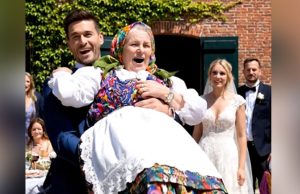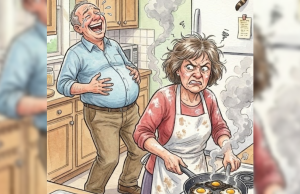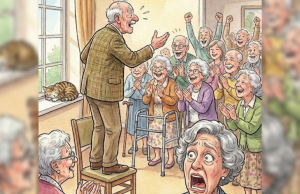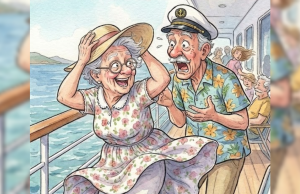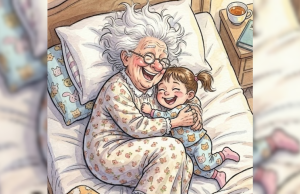The son kicked his father out of the house at the insistence of his wife… But a random encounter in the park turned everything upside down…
He sat on the cold iron bench, wrapped in a worn-out coat — the one he used to wear while working as a foreman for the municipal service. His name was Nikolai Andreyevich. A pensioner, a widower, the father of an only son, and, as he once thought, a happy grandfather. But all of this collapsed one day.
When his son brought Olga home, everything inside Nikolai froze. Her energy was too sharp, her gaze too cold, hidden behind a charming smile. She didn’t scream or cause scandals — she simply and subtly pushed out of the man’s life everything that stood in her way. And Nikolai felt it immediately. But nothing could be changed anymore.
At first, his things disappeared: books were moved to the attic, his favorite armchair became “excess,” the kettle suddenly vanished. Then the hints started: “Dad, maybe you should go for walks more often? The air is good for you.” And soon there was a suggestion: “You’d probably be better off in a retirement home or at Aunt’s in the village.”
Nikolai didn’t answer. He just packed up what little was left of his things and left. No words of reproach, no tears, no pleas — only pride and pain, lodged deep in his heart.
He walked through the snow-covered streets like an invisible man. Only one bench in the park became his support — the place where he once walked with his wife and then with his little son. There, he spent hours staring into the emptiness.
And then, on one especially cold day, when the frost tingled on his face and his eyes clouded from the cold and sorrow, a voice sounded:
— Nikolai? Nikolai Andreyevich?
He turned around. A woman stood before him in a warm coat and scarf. He didn’t recognize her at first, but his memory stirred — Maria Sergeyevna. His first love. The one he lost because of his service and later forgot when he married Lydia.
In her hands was a thermos and a bag with homemade pastries.
— What are you doing here? You’re freezing…
This simple question, filled with care, warmed him more than any coat. Nikolai silently accepted the thermos of tea and the buns. His voice had long since left him, and his heart hurt so much that even tears didn’t come.
Maria sat next to him, as if time between them had stopped, not passed.
— I sometimes take walks here, — she began softly. — And you… why are you here?
— It’s just a familiar place, — he smiled slightly. — This is where my son took his first steps. Do you remember?
Maria nodded. Of course, she remembered.
— And now… — Nikolai sighed, — he’s grown up, married, got an apartment. His wife said: “Choose — me or your father.” He chose. I don’t blame him. Young people have their own worries.
Maria was silent, only looking at his reddened hands, cracked from the cold, so familiar and so lonely.
— Come with me, Nikolai, — she suddenly suggested. — It’s warm, we’ll eat, and tomorrow we’ll decide what to do next. I’ll make you some soup, we’ll talk about everything. You’re not a stone, you’re a person. And you shouldn’t be alone.
He didn’t move for a long time. Then, quietly, he asked:
— And you… why are you alone?
Maria sighed. Her eyes became glassy.
— My husband died a long time ago. My son… passed away before he was born. After that — life, work, pension, a cat, and knitting. Everything in a circle. You’re the first person in ten years with whom I’m drinking tea, not in solitude.
They sat there for a long time. Passersby thinned out, the snow fell softly, as if trying to muffle their pain.
The next morning, Nikolai woke up not on the bench, but in a cozy room with daisy curtains. The air smelled of pies. Outside, there was winter frost on the trees. And inside — a strange feeling of peace, as though someone had returned his right to live.
— Good morning! — Maria entered with a plate of syrniki. — When was the last time you ate homemade food?
— About ten years ago, — Nikolai smiled. — My son and his wife always ordered food.
Maria didn’t ask more questions. She simply fed him, tucked him in with a blanket, and turned on the radio in the background — so it wouldn’t be so quiet.
Days passed. Then weeks. Nikolai seemed to come back to life. He fixed chairs, helped with the household, told stories about work, about how he saved a colleague from a gas explosion. And Maria listened. Cooking him soup from his childhood, washing his socks, and knitting him a scarf, she gave him what he hadn’t felt in a long time — care.
But one day, everything changed.
Maria was coming back from the market when she saw a car at the gate. A man got out of it, and Nikolai would have called him his son. Valery.
— Hello… Excuse me… Do you know if Nikolai Andreyevich lives here?
Maria felt her heart tighten.
— And who are you to him?…
📖 Read the continuation in the comments
He sat on the cold metal bench, draped in a faded cloak—once worn during his time as a master at the housing office. His name was Nikolai Andreevich. A pensioner, widower, father of a single son, and, at one point, a proud grandfather. But all of that changed one fateful day.
The moment his son introduced Olga to the family, Nikolai felt an unsettling chill. Her presence was too intense, her gaze too cold, veiled behind a deceptive smile. She didn’t raise her voice or cause drama—she simply, quietly, pushed everything that mattered to the man out of her way. Nikolai sensed it from the start, but by then, there was no turning back.
First, his possessions disappeared: his books were moved to the attic, his cherished chair was deemed “unnecessary,” and eventually, even the kettle vanished. Then came the subtle suggestions: “Dad, maybe you should spend more time outside? The fresh air would be good for you.” Before long, the idea was presented: “Maybe it would be better for you in a retirement home, or with Auntie in the village.”
Nikolai didn’t respond. He simply gathered what little remained of his things and left. No accusations, no tears, no pleas—just pride and pain, buried deep in his heart.
He wandered the snow-covered streets, like an invisible man. Only one bench in the park became his support—a place where he once walked with his wife, and later with his young son. There, he spent hours, staring into the emptiness.









